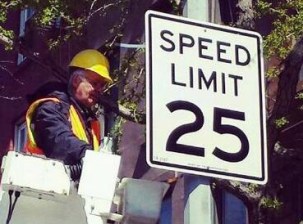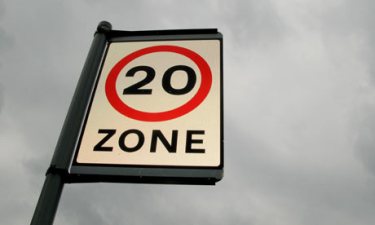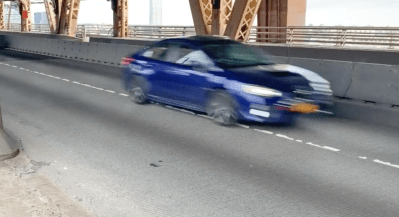Memo From Massachusetts: 25 MPH Speed Limit Would Save Lives

Researchers in Massachusetts have concluded that lowering the default speed limit on local roads from 30 to 25 mph would save lives and yield big public health benefits. Even without additional traffic calming measures, a lower speed limit on its own would prevent 2,200 crashes, 1,200 injuries, and 18 fatalities in the state of 6.6 million, according to an analysis of a 25 mph bill considered by the Massachusetts legislature last year. These numbers should be on the minds of New York legislators, who have the potential to save lives with a 25 mph bill of their own.
By lowering speed limits on local roads to prevent deaths and injuries, Massachusetts workers and employers would save $210 million annually by avoiding the costs of medical payments and missed work, according to a first-of-its-kind health impact assessment from the Metropolitan Area Planning Council.
Traffic analysts found that lower speed limits would add $148 million in annual costs, based mainly on the assumption that drivers would seek out longer routes that may not be as direct but would yield higher speed limits. Even with the added driving, the extra pollution would not result in any deaths, and the reduction in injuries and fatalities outweighed the additional costs.
If anything, the study undercounted the potential benefits of lower speed limits. “The health cost savings are done very, very conservatively,” said MAPC public health manager Barry Keppard. For example, the study did not measure the impact of calmer streets on property values, or whether lower speeds would encourage more people to walk or bike.
The speed limit bill in Massachusetts would have applied to local roads across the entire state, from the Berkshires to Boston. Although there is broad support for a 25 mph speed limit, the bill has stalled in the legislature because of wrangling over local control. “It didn’t have to do with the content and the substance,” said WalkBoston Executive Director Wendy Landman. “The advocacy got stuck on this other stuff.”
The situation here in New York is different. The bill in Albany would only apply to New York City, and its success hinges on the backing of State Senate leadership. On Tuesday, Families for Safe Streets is hosting a press conference to demand action from the Senate.
“Maybe it would be useful in New York,” Landman said of the report.


